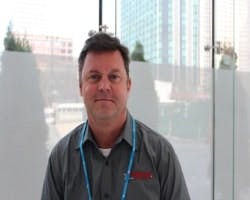CARSTAR CEO Weighs in on Industry Consolidation
DETROIT, Aug. 1, 2014—FenderBender met with CARSTAR CEO David Byers outside NACE’s 2014 Collision Repair Executive Symposium on Friday to talk about some of the topics being discussed inside—namely industry consolidation and what it means for the future of collision repair. Here are some highlights from the interview.
Consolidation continues to be a big topic in the industry. Where does CARSTAR fit in and what is your vision for future growth?
Obviously there’s tremendous consolidation going on and that’s forcing all of those independents and small MSOs to take a look at their future in the marketplace and say where am I going to be? What is the right place to be? One of the biggest challenges I find when talking to these independents around the country is that they are saying I need access to capital resources, I need access to human resources in ways that will allow me to compete in the future.
We at CARSTAR have a unique role in that we are primarily a franchise organization and that is a different model. We find that model to be highly relevant. Historically franchise units outperform the company units. And that’s because it’s the blood, sweat and tears of the owner/operator involved in the business.
Basically [independent shops] have three choices: They can go it alone, which is going to be increasingly challenging given the environment, they can sell to a consolidator if they can get the price they want, or they can join a network. We’re the only nationwide network that exists in the U.S. and certainly in Canada today. And we continue to believe that’s a pretty unique value proposition. It allows a business owner, particularly a first or second generation owner who wants to keep the business in the family, a way to do that, to participate in this more global environment. They get access to the resources, access to human capital, access to training, access to things like aluminum certification.
We were announced as the largest MSO in North America, so we retain that No. 1 position. As the largest network we can leverage our scale for lots of things. We have aggressive growth plans like everybody else. We have said that we plan to have 500–600 stores in the course of the next several years across North America. But I think more important to us, frankly, is quality over quantity.
Are there any challenges that come along with the type of rapid growth we’re seeing from MSOs? Problems maintaining culture and consistency?
I think that is probably the biggest challenge that some of the larger MSOs are facing today. How do you successfully integrate culturally, operationally and from a human capital perspective. It takes time, it takes a lot of resource to get that done and I think that everyone in the industry is going to have to pace themselves at a rate that they can successfully integrate appropriately over time. The worse thing that one could do is go through a large acquisition phase and not be able to do successful integration.
What do you think it will take for independent shops to succeed as the industry shrinks?
I think the longterm prognosis of this industry is that it is going to continue to consolidate and you are going to end up with a handful of major national brands. I think there is always going to be a market for the independents, but I think that the independents that will be successful are those who are larger, are more sophisticated about KPI (key performance indicator) management, more sophisticated about operations management, have the access to capital that is needed to be able to grow over time, and have access to training programs and purchasing agreements.
You've almost got two groups of independents. One that says I get it, I'm on board, I understand what the future is and I understand what I need to do to be successful. The other group says I'm going to put my head in the sand, pretend that KPIs aren't important, pretend that operational procedures aren't important, and I'm just going to, quote, focus on the customer. Well, that's nice, but ultimately I don't think that's what's going to drive success in the industry.
More on the Symposium:
Byers was among more than 300 shop executives from across the country who attended Friday’s Collision Repair Executive Symposium, formerly known as the MSO Symposium. Independent operators were invited to join the session this year.
“As time has gone on, this has become our most popular event here at NACE,” said ASA Executive Director Dan Risley at the start of the symposium. “And as we looked at this coming year, we thought that it probably needed to be reinvented a little bit, kind of like some of the things that we’re doing with the show, to make it a little bit more inclusive.”
Speakers representing shops, insurers, consulting companies and information providers discussed changing market dynamics, processes for maximizing throughput and KPIs, evolving vehicle designs and repairs, and steps for proper acquisitions.
